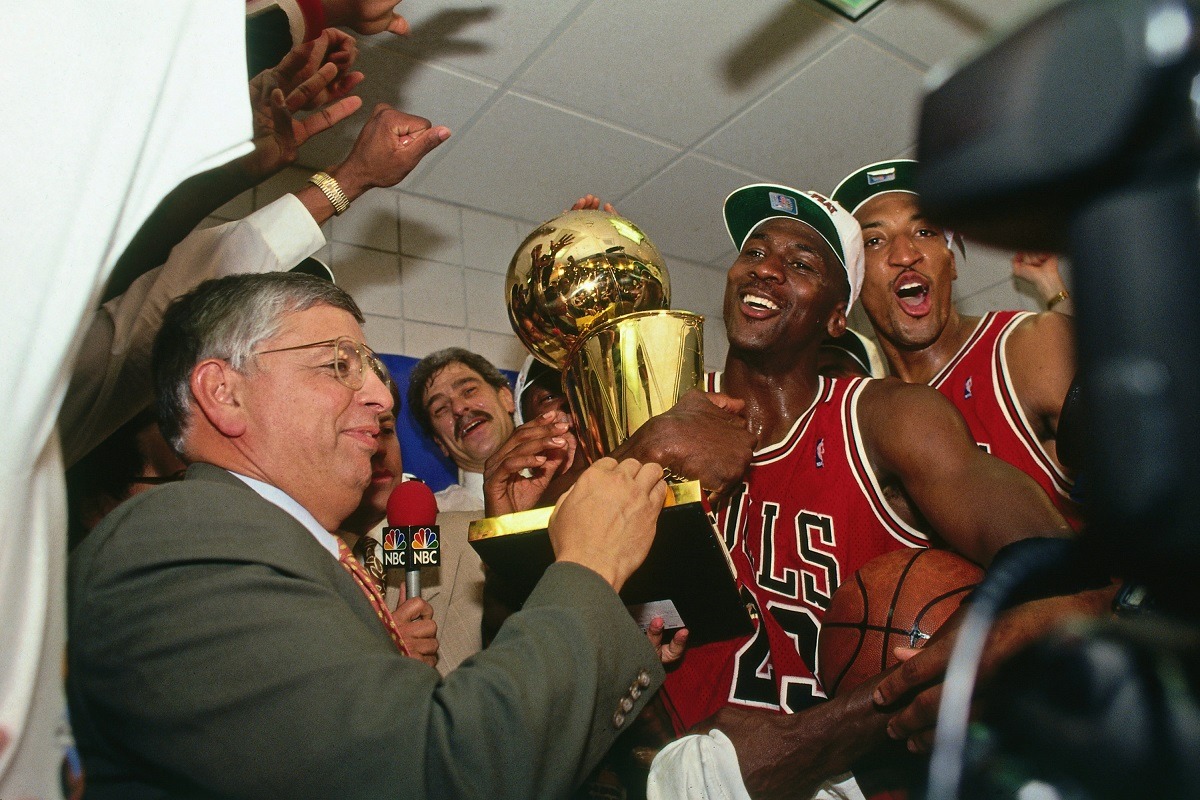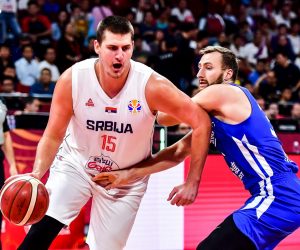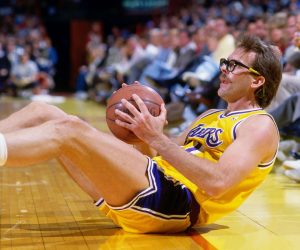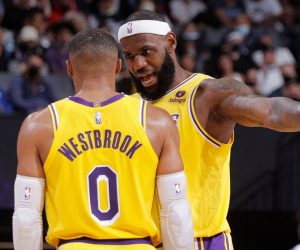Between 1991 and 1998, Michael Jordan led the Chicago Bulls to six NBA titles during their 1990s dynasty, bookended by three-peats before general manager Jerry Krause broke up the team, and Jordan retired for a second time.

It’s no surprise that Jordan was named MVP of the NBA Finals in each of the years the Bulls won the championship.
In the two seasons the Bulls didn’t appear in the NBA Finals, Jordan was either retired for the 1993-94 season or spent most of the 1994-95 season in retirement.
If Jordan hadn’t retired prematurely after the murder of his father in the summer of 1993, the Bulls could have won eight-straight titles. At least that’s what superfans in the greater Chicago area argue in regard to the only low-point during their supreme dynasty.
NBA Championships (1991-1998)
1991 Chicago Bulls
1992 Chicago Bulls
1993 Chicago Bulls
1994 Houston Rockets
1995 Houston Rockets
1996 Chicago Bulls
1997 Chicago Bulls
1998 Chicago Bulls
The Bulls achieved their first three-peat between 1991 and 1993. The Dream Team and the 1992 Barcelona Olympics were also sandwiched in the middle of that first three-title run. After the first three-peat, a burned-out Jordan retired.
During their second Chicago Bulls three-peat, Jordan pushed their dynasty and championship run as far as it would go before Krause broke up the team. “The Last Chance” documentary covers Michael Jordan’s final season with the Bulls during their sixth championship season in 1997-98.
Three-peat: 1991, 1992, 1993
The Bad Boy Detroit Pistons brutalized the league to win back-to-back championships in the late 1980s. The Pistons unleashed the “Jordan Rules” to stop Jordan by basically beating the crap out of him.
The Bulls finally took down the Pistons after Jordan bulked up, Jerry Krause drafted Scottie Pippen, and Phil Jackson added Tex Winter’s Triangle Offense to the playbook.
In the 1991 playoffs, the Bulls held the #1 seed in the east. They swept the Knicks in the first round and sidestepped the Sixers in the semifinals. In their final showdown against the Pistons, the Bulls swept the Bad Boys 4-0. The series ended with a dickish move by the Pistons, spearheaded by Isiah Thomas, who left the court before the game ended and never shook hands with the opposing team. In many NBA circles, Thomas’ no-handshake led to him losing a spot on the first Dream Team. The Bulls defeated Magic Johnson and friends in the NBA Finals, which marked the beginning of the end of the Showtime Lakers era.
In 1992, the Knicks forced the Bulls to seven games in the east semifinals before the Bulls knocked them out of the playoffs. The Bulls picked off the Cleveland Cavaliers in the Eastern Conference Finals before knocking off Clyde Drexler and the Portland Trail Blazers in six games to win back-to-back titles.
In 1993, the Bulls swept their first two opponents in the playoffs (Hawks and Cavs) before meeting the Knicks in the Eastern Conference finals. The Knicks put up a good fight, but lost in six games. In the NBA Finals, Jordan and company beat down Charles Barkley and the Phoenix Suns to win their third consecutive title and secure their first three-peat.
Retired Life, Pippen Years, I’m Back
Jordan retired before the start of the 1993-94 season after his father was murdered. Scottie Pippen quickly stepped in as the role of the Alpha on the Bulls.
The Knicks and Bulls went a full seven games in the 1994 Eastern semifinals before the Knicks prevailed in Game 7. Pippen refused to enter the end of Game 3, which set off a chain reaction of events that tainted the rest of his career with the Bulls.
Jordan pursued his passion for baseball and gave it a shot with the Durham Bulls. He hit .202 as an outfielder. When MLB players decided to strike in 1995, Jordan refused to cross the picket line as a replacement player. With players in the middle of a strike, a bored Jordan went back to Chicago to work out with the Bulls. After a couple of practices, he decided it was time to return to his #1 love.
“I’m back,” Jordan responded in a succinct message to the world.
Jordan had gotten his body into proper baseball shape, but he wasn’t in proper basketball shape. A winded Jordan tired quickly and didn’t have his sea legs in the fourth quarter during a key point of the game in which he would dominate.
Jordan devoted the offseason to returning to peak form. When he returned for his first full season, he began his quest to return to championship glory.
72 Wins in 1996 and Flu Game in 1997
You can’t have a true dynasty without a near-perfect season, which the Chicago Bulls achieved in Jordan’s first full season back after his hasty retirement. In the 1995-96 season, the Bulls won 72 games and lost only 10 during one of the single greatest seasons in all of professional sports. That team held the record for most wins for almost two decades before the Golden State Warriors won 73 games in 2016.
Jordan and the Bulls lost only one game in the Eastern Conference playoffs. They Swept Shaq and the Orlando Magic in the Eastern finals. Jordan met Gary ‘”The Glove'” Payton and Shawn Kemp in the 1996 NBA Finals. The Bulls jumped out to a 3-0 lead, but it took six games for them to finally finish off the Sonics. The Bulls won their fourth title and an emotional Jordan wept on the floor of the locker room as he grieved for his dead father.
Then, Karl Malone and John Stockton took a shot at dethroning Jordan and the Bulls. It didn’t happen, and the Mailman and the Jazz lost in six games. The 1997 NBA Finals included the legendary flu game in which Jordan dropped 38 points while sick as a dog in Game 5.
One NBA conspiracy theory suggested Jordan was nursing a huge hangover after gambling in Las Vegas. Whether he was degening it up in Vegas, or had food poisoning, his royal Airness still torched the Jazz on their home court. Jordan won back-to-back titles and locked up a fifth ring for the Bulls.
Three-peat Reprise, The Last Dance
ESPN’s “The Last Dance” covers the circus-like atmosphere of the Chicago Bulls during the final season of the 1990s dynasty. Phil Jackson dubbed the season “The Last Dance” because he knew it was his last season the Bulls head coach. Jerry Krause, embittered because he didn’t get enough credit for building a dynasty in Chicago, wanted to break up the team and start all over.
Jordan refused to play for any other coach aside from Jackson. If Jackson didn’t return, then Jordan intended to retire. In essence, the entire team went into that season with full knowledge that it was going to be their last hurrah.
In the 1998 NBA Finals, the Mailman and Jazz failed another chance to win a title. The Bulls prevailed in six games. They secured a sixth title and locked up a second three-peat as the dynasty for Jordan and the Bulls reached a triumphant, yet somewhat sad ending











